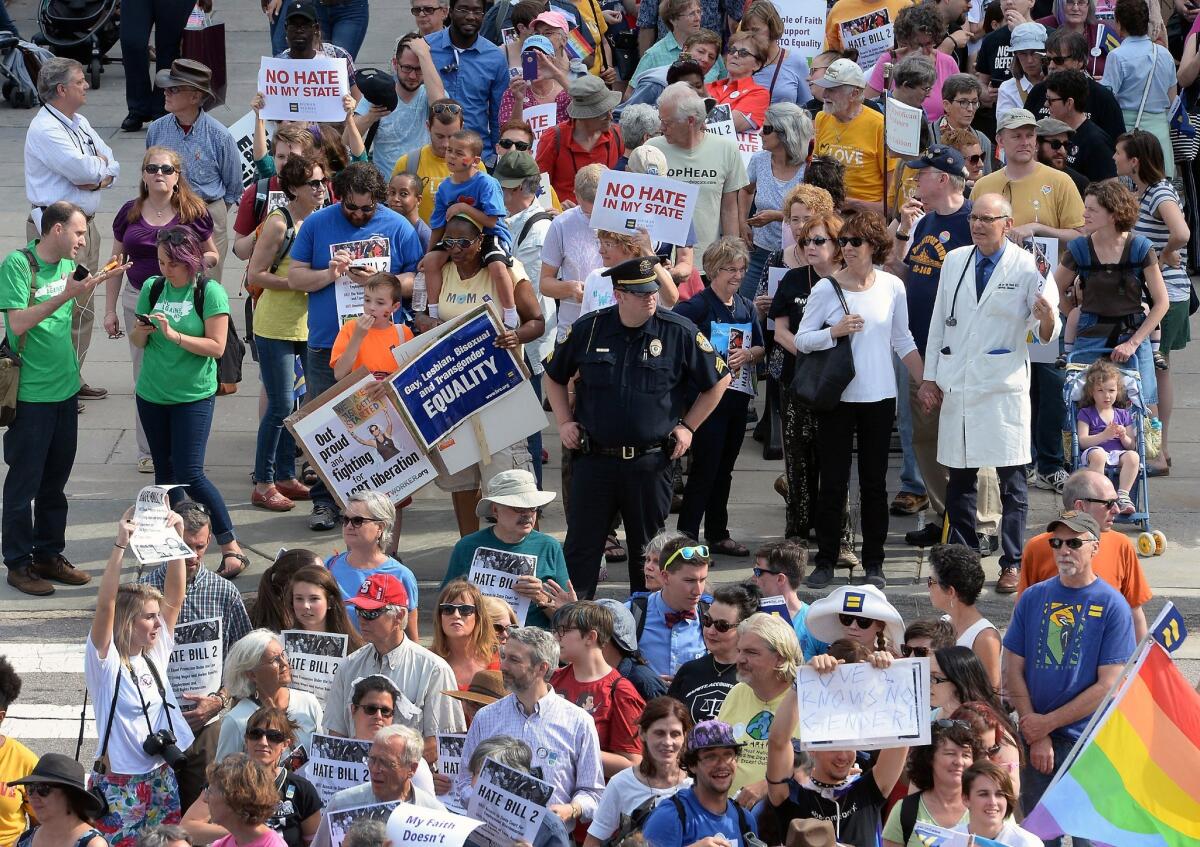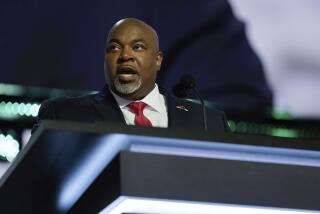Education group enters ‘belly of the beast’ to oppose North Carolina’s LGBT law

A protest in Raleigh, N.C., against a Republican-backed law curtailing protections for LGBT people.
- Share via
Reporting from Raleigh, N.C. — Jennifer Wolfsie, like many visitors to Raleigh, N.C., wasted no time exploring the hip Southern city, ordering clams, beet salad and potatoes aligot at Death & Taxes on Hargett Street, finishing off with a nightcap at Fox Liquor Bar.
But at each place the Midwest school board member left not only a tip but also a white paper square with a message about a new state law that critics say discriminates against gay, lesbian and transgender people.
“I believe in equality for all,” said the paper, printed by the organizers of the education conference she was attending this month. “I will not return to the state until HB2 is repealed. Make North Carolina a place I want to visit again.”
Wolfsie, from Kansas City, Mo., was among about 500 recent conventioneers in an unusual bind over North Carolina’s House Bill 2, which has stirred international debate by requiring people to use the bathroom designated for the gender listed on their birth certificate.
Pearl Jam, Boston and other bands and artists canceled concerts. Corporate giants including PayPal and Deutsche Bank nixed expansion plans. Convention bookings dropped, and the National Basketball Assn. discussed playing next year’s all-star game, scheduled to take place in Charlotte, in a different state.
But the fledgling Network for Public Education, a group of liberal-leaning parents and educators, stuck with the decision to hold its third annual national get-together in Raleigh on April 16 and 17.
The group considered the bathroom law another reason to enter “the belly of the beast” and challenge conservative Tar Heel State politicians who, as activists with the education group see things, are determined to destroy public education.
“We want to go where the fight is,” said conference chairwoman Colleen Wood. “Where teachers and parents need support and where we can shine the light on what is happening in their community.”
In recent years, the state’s lawmakers have barred new teachers from being able to earn tenure protections, and teachers now are rated based on student standardized test scores.
North Carolina already is a “right to work” state that bans collective bargaining for government employees, but legislators further weakened the state’s teachers association by eliminating automatic dues deductions for members.
Spending on traditional public schools has improved recently but not to the levels before several years of cutbacks, according to budget analysts.
At the same time, the Legislature and Gov. Pat McCrory rapidly expanded the number of charter schools. They have proved popular with many parents, but unions and other critics say charters undermine traditional public schools and that some charters avoid serving students who are more expensive or difficult to educate.
The state also started a voucher program, which provides some lower-income families about $4,000 toward private school tuition — another bete noire for many public school educators.
“In North Carolina, we have no union and teachers are scared to speak out,” said Kelly Barlett, an elementary school reading specialist who drove about 30 minutes from Apex to attend the conference. “I’m glad the conference was here.”
Were it not for the political furor, Raleigh in spring would be hard to top as a congenial setting. Pink, red and white azaleas splash color in frontyards. Dogwood trees break out with white or pink petals, then follow with bright green leaves. The weather alternates between balmy and refreshingly brisk.
Downtown Raleigh sports new high rises, high-end watering holes and down-home, pulled-pork joints with sweet tea. Top hotels connect directly to the convention center.
The state’s population is increasingly diverse and, for decades, the state was home to a moderately liberal Southern strain, but well-funded, pro-business Republicans hold firm sway in the statehouse, sustained at the polls largely by white voters who embrace values associated with the religious right.
President Obama narrowly lost the state in 2012, with his overwhelming support from black voters offset by overwhelming opposition from white voters, especially those from outside the largest metropolitan areas, according to exit polls.
The law dictating bathroom use also limits discrimination lawsuits and curtails the power of local government — preventing cities and counties from raising the minimum wage, for example, or passing other pro-labor measures.
State Republican leaders show few signs of backing down. McCrory has said he’ll urge the Legislature to restore an employee’s right to seek legal recourse for discrimination. But the bathroom restrictions should remain, as should the ban on local nondiscrimination laws, he said.
“The governor respectfully disagrees with the political left’s national agenda to mandate changes to basic, common-sense restroom norms,” McCrory’s office said in a statement issued Friday.
For support he can look to conservatives such as Roger Severino, director of the DeVos Center for Religion and Civil Society at the conservative Heritage Foundation in Washington.
See more of our top stories on Facebook >>
Severino finds it hypocritical that corporations such as Apple criticize North Carolina, yet still do business in the United Arab Emirates, which has a comparatively atrocious human rights record. (At this point, Apple isn’t pulling its stores from North Carolina either, nor its giant data center from the town of Maiden, about 37 miles north of Charlotte.)
“The cultural left has teamed up with big business to bully states against passing religious liberty bills and common-sense bathroom protections for privacy and safety,” Severino said.
It’s doubtful a boycott of any kind could truly cripple commerce in a state as large as North Carolina, said economist Dean Baker, founder of the liberal-leaning Center for Economic and Policy Research in Washington.
The cancellation of events and corporate relocations exert pressure because “the state of North Carolina looks really bad,” Baker said. “From the standpoint of the politicians who pushed this, they are suddenly looking very foolish.”
Pearl Jam’s Eddie Vedder told a concert audience in Hampton, Va., last week that the group decided it could send a powerful message by canceling its North Carolina appearance.
“Because they have a law there that broadly discriminates against a whole group of people,” he said. “The reality is there is nothing like the immense power of boycotting.”
Twitter: @howardblume
ALSO
NBA commissioner: All-Star Game in North Carolina hinges on changing LGBT law
Pearl Jam joins North Carolina concert boycott: Who else is protesting anti-gay law?
L.A. City Council votes to stop doing business with North Carolina and Mississippi over LGBT laws
More to Read
Sign up for Essential California
The most important California stories and recommendations in your inbox every morning.
You may occasionally receive promotional content from the Los Angeles Times.











